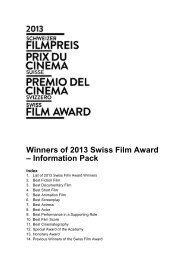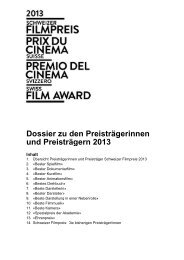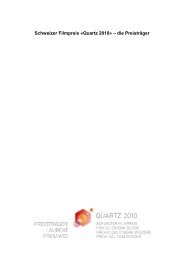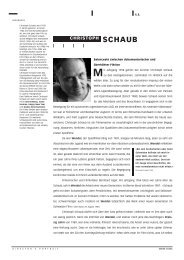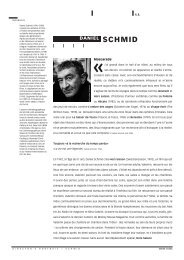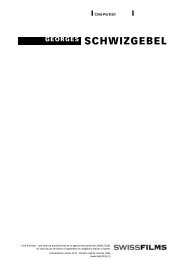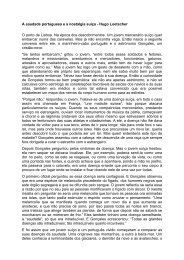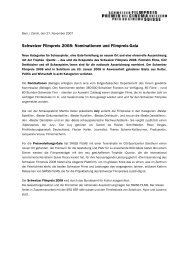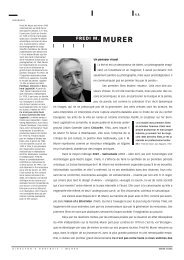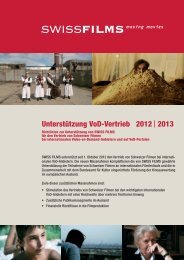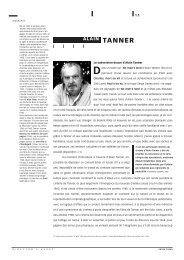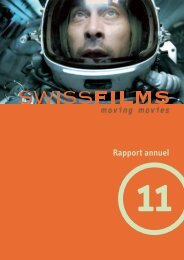Director's Portrait Fredi M. Murer - Swiss Films
Director's Portrait Fredi M. Murer - Swiss Films
Director's Portrait Fredi M. Murer - Swiss Films
Create successful ePaper yourself
Turn your PDF publications into a flip-book with our unique Google optimized e-Paper software.
Script: <strong>Fredi</strong> M. <strong>Murer</strong><br />
Camera: Pio Corradi<br />
“As Bertrand Russell put it, the<br />
question right now is how to overcome<br />
‘the unwillingness of the<br />
human race to acquiesce to its own<br />
survival’. This same question reverberates<br />
through <strong>Fredi</strong> M. <strong>Murer</strong>’s<br />
film The Green Mountain. It is not,<br />
however, an attempt to persuade,<br />
but a cinematic ‘Landsgemeinde’,<br />
a form of grassroots democracy<br />
addressing big and small issues to<br />
do with the disposal of radioactive<br />
waste… On all levels, the democratic<br />
spirit is maintained. Despite<br />
the complexity of the subject,<br />
despite the differing positions and<br />
despite the ‘for and against’ split,<br />
<strong>Fredi</strong> M. <strong>Murer</strong> and his excellent<br />
team, headed by cameraman Pio<br />
Corradi, have succeeded in creating<br />
a cinematic whole which avoids<br />
arrogant interrogation, gives people<br />
time to reflect and presents the<br />
encounter to the audience in a way<br />
that invites us to form our own<br />
opinion. The Green Mountain is an<br />
outstanding work, which pursues<br />
its formal, artistic goals and its message<br />
with the same single-mindedness.<br />
This film, whose geographical<br />
and thematic focus is the Wellenberg,<br />
becomes a mirror of modernday<br />
Switzerland.”<br />
Der kleine Bund, 16 June 1990 (Fred Zaugg)<br />
“In the last few decades, there has<br />
been a sore lack of <strong>Swiss</strong> documentary<br />
films that have dealt convincingly<br />
with contemporary <strong>Swiss</strong><br />
reality. With The Green Mountain,<br />
<strong>Fredi</strong> M. <strong>Murer</strong> has not only tackled<br />
a highly topical theme, but picked<br />
away at the seams between what<br />
we are told and the real truth.”<br />
NZZ, 1 June 1990 (Christoph Egger)<br />
1990 16mm colour 128’ Der grüne Berg<br />
W<br />
D O C U M E N T A R Y / M U R E R<br />
Sound: Tobias Ineichen and Florian<br />
Eidenbenz<br />
Editing: Kathrin Plüss<br />
Production: Bernhard Lang AG<br />
THE GREEN MOUNTAIN<br />
hile researching and shooting Alpine Fire, <strong>Fredi</strong> M. <strong>Murer</strong> becomes acquainted with the<br />
country and people around the Wellenberg in the Wolfenschiessen area of Nidwalden. When,<br />
in 1988, tensions escalate over plans by NAGRA (the national radioactive waste removal company)<br />
to build a permanent nuclear waste disposal site at the foot of the Wellenberg, <strong>Murer</strong> is so affected<br />
that, without even thinking about a film, he travels to Nidwalden at the weekends and starts talking<br />
to the people there. The political impotence of the farmers of Wolfenschiessen, who are affected by<br />
the plans, so enrages <strong>Murer</strong> that, with a view to the forthcoming national poll (September 1989) on<br />
the “Say No to Nuclear Power Stations” initiative, he decides, together with cameraman Pio Corradi,<br />
to shoot a roughly 20-minute long “intervention film”. The result of this undertaking is more than two<br />
hours of documentary film, which <strong>Murer</strong> laconically subtitles a “cinematic people’s assembly”. The<br />
documentary provides a forum for experts, representatives of the political authorities and NAGRA,<br />
and, above all, for the directly affected locals – families for whom the Wellenberg has been home for<br />
generations and whose land and existence is to be cut from under them. These people have formed<br />
a regional action group to fight the project. In <strong>Murer</strong>’s film, they sit around the regulars’ table of<br />
their local pub, the children nearby, and talk with grave concern about radioactivity and Chernobyl,<br />
about how the little people are being fleeced by industry, technology and capital. <strong>Fredi</strong> M. <strong>Murer</strong><br />
dedicated The Green Mountain to the “children and children’s children” and confronts the grown-<br />
ups who are in charge today with the next generation. Seen in this light, The Green Mountain<br />
comes across as a preliminary study for Full Moon, which came eight years later.<br />
World Rights: <strong>Fredi</strong> M. <strong>Murer</strong><br />
Original Version: <strong>Swiss</strong>-German<br />
SWISS FILMS



